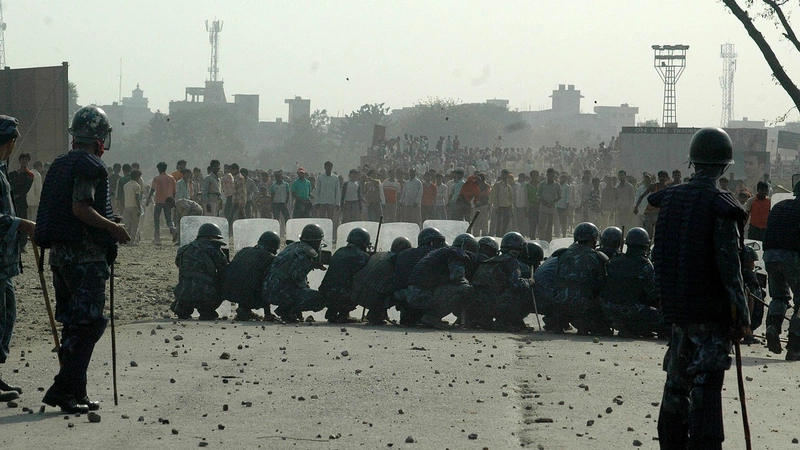The Madhesh Crisis of Nepal, whereby the Madhesh communities would launch a political movement for identity and equal rights, becomes the backdrop for “Pooja, Sir” (2024). More specifically the 2015 Madhesh Movement becomes the substrate on which this taut police procedural takes place.
Amidst this politically tumultuous environment of 2015, Inspector Pooja Thapa is deployed from Kathmandu to the border town of Rajgunj to investigate the kidnapping of two children in broad daylight, in the middle of a political proceeding. The investigation is heavily integrated within the political standpoint because one of the kids kidnapped is the son of a Madheshi politician, who had married a light-skinned woman to enjoy an upper-echelon status in society. The politician’s wife is also the headmistress of the school where the two kids studied. The politician is not the most popular in his community, while the rescuing of this child is the priority of the police chief.
Pooja, on the other hand, is brusque yet empathetic. Sporting a buzz cut, binding her breasts as part of her morning routine of getting ready for work, or even preferring the masculine honorific rather than the feminine one, shows a woman preferring to remain within her masculine garb. Her life as a queer woman, living with her girlfriend and her aging father, is at worst looked on with suspicion, or at best not remarked upon.
The investigation becomes the priority, with the rescue of both the kidnapped kids garnering equal attention from her and her team, irrespective of her superior’s political ambitions and the resultant ego tussles. The film too takes that statement to heart, with the story heavily focusing on the investigation and the conflicts faced by Pooja and her team along the way, both in deducing the case or internal ideological differences.

The central ideological conflict stems between Pooja and her subordinate Mamata, a strong-willed Madheshi woman who finds herself the target of discrimination within the workplace. Through her perspective as well as the exchange of ideas between Mamata and Pooja, we learn about the intricacies of the sociopolitical unrest within Nepal. It’s in these moments that the political backdrop takes center stage, with Pooja, herself a recipient of prejudice and discrimination, realizing the extent of the same afforded to Mamata and the community at large.
This heightened focus on the milieu and integrating that specificity within a genre of storytelling is what makes the police procedural at the center of the film somewhat captivating. It offsets the lack of character depth or development afforded to Pooja, as the film doesn’t act on the balancing of the personal and the professional in terms of storytelling. Thus the personal exploration of Pooja’s strained relationship with her father gets shafted, and by the end feels somewhat redundant.
Director Deepak Raunyar utilizes a lot of close-quarter shots to almost induce a sense of claustrophobia. He is very efficient at creating set-pieces that allow the intensity to be maintained when the film is exploring a chase scene through a political gathering under conflict by the police in riot gear or when Pooja and her subordinate are almost overwhelmed by the crowd ganging up on them. The film, however, lacks this same energy and momentum when focused on the progression of the plot, especially as the film moves towards the third act.
There are moments, with the introduction of two important characters towards the end of the second act and the police acting on hunches that would be recited rather than shown, that make the film feel scattershot as it almost rushes towards the finish line. The film’s climax, per its themes, is less about the case being solved but more about Pooja almost choking with the realization of the problems not being brought to attention, and her incapability in actually providing any meaningful solution. There is a cynical bleakness emblematic of the noir present here, and the somewhat documentary style of filmmaking allows for a gritty vibe within the procedural.
However, the film itself feels askew of what the title hints at as its ultimate exploration—a character study of Pooja Thapa working closely within the confines of the genre plot, which is absent in the film. The craft in the filmmaking and the strong performances elevate the film, making it compelling to watch despite its glaring flaws.





![Paths of Glory [1957]: An Anti-War Anthem](https://79468c92.delivery.rocketcdn.me/wp-content/uploads/2017/07/paths-of-glory-768x432.jpg)



